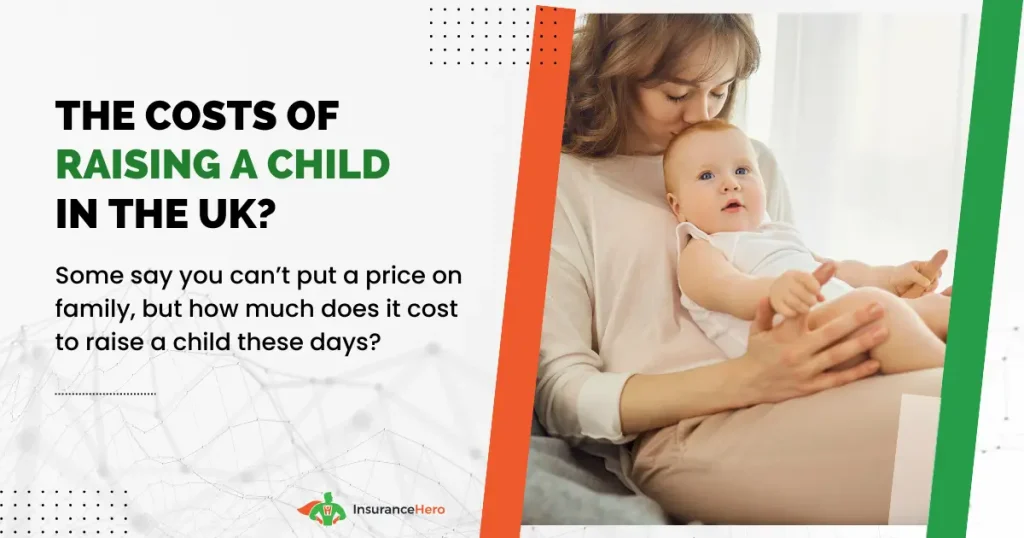The Cost Of Raising A Child In The UK

Are you planning on having a child in the near future? Do you wonder how much it will cost to have a baby in the UK in 2025?
The cost of raising a child in the UK in 2025 is a significant factor to consider when planning on starting or expanding a family.
We’ve put together this detailed guide on the costs of having and raising a child in the UK to help you make an informed decision about your family’s insurance.
How much does it cost to raise a child in the UK?
Starting a family often means reevaluating a family’s budget and looking into different options to help fund this event’s new financial circumstances.
According to the Child Poverty Action Group’s Cost of a Child report, the average cost of raising a child to the age of 18 in the UK in 2025 was £260,000 for a couple and £290,000 for a single parent.
Data presented in this report clearly shows that the costs of having and raising a baby are greater than a few years ago.
This trend has continued throughout the last decade, as another paper points out that the average cost of raising a child till the age of 21 has increased by 37% over the last ten years.
Several factors significantly facilitate this trend, inflation being one of the most impactful factors. This guide outlines some of the most crucial costs parents must cover when raising a child in the UK.
The average cost of raising a child 0-18
How much does the average child cost in the UK from birth until 18 years of age?
To see all the costs, it is helpful to look at all the essentials that are required and expected for parents to provide for their children.
This includes:
- Housing – as well as all the mortgage payments and costs of utilities like water and electricity.
- Food – it is estimated that the average annual cost of food for a family in the UK is around £5,028.
- Clothing – this also includes costs of school uniforms, which can be calculated to be around £337 per year for each secondary school child and £315 per year for each primary school child.
- Education – Education costs are mainly related to payments for textbooks, school supplies, school-related activities, etc.
- Childcare is one of the most substantial costs people with children must be prepared to pay. Costs of childcare include nursery, childminders, and after-school care.
- Other activities – hobbies, trips, and extracurricular activities—should also be considered when organising a family’s budget.

As mentioned earlier, the average cost of raising a child in the UK is estimated to be £160,692 for a couple and £193,801 for a single parent.
These costs are spread out across eighteen years, but still, it’s a large sum of money for a family budget.
Securing your family’s future is critical to choosing the right life insurance policy.
A good life insurance policy can prevent or minimise any major financial difficulties in the event of being diagnosed with serious illness, in case of the death of a partner, or other unfortunate events.
Contact us to compare plans from the leading life insurance companies and find the right policy for your needs.
Cost of Childcare in the UK in 2025
Organising childcare is almost always an inevitable part of having a child for working parents.
Unfortunately, childcare costs are not small, and over the years, it has been increasing. This often leads to a situation in which childcare cost takes up a substantial part of a family’s weekly budget.
The overall cost of childcare will differ depending on where you live in the UK, what kind of service you are looking for, and how many hours a week you need someone to take care of your child.
In the UK, parents have two main childcare options: full-time (50 hours a week) and part-time (25 hours a week). Of course, full-time childcare is the more expensive option.
On average, a full-time day nursery for a child under two costs £14,000 a year and £269.86 per week.
To provide a child over two years old with such care, parents have to spend £13,632 per year on average, £262.16 a week.
A full-time childminder for a child under two can cost up to £12,339 per year, which is £237.28 per week. When a family decides to hire a full-time nanny, they must be prepared to pay £400 to £650 each week.
The situation looks a little better when it comes to part-time childcare. For children under two, nursery costs are around £7,212 per year, which is £138.70 per week.
These costs will subsequently be £6,952 per year, which is £133.69 a week, for children aged two and over.
£6,469 per year and £124.41 a week are the costs of a part-time childminder for a child under two years old. However, a nanny costs around £250 to £400 per week.
Some families choose to participate in an au pair program, and in this situation, costs will be much different because an au pair is more like another family member.
Usually, an au pair will receive pocket money (around £90 per week) in addition to their salary.
Childcare costs are substantial. Ensuring they can be covered each week is very important for families and households where both parents work full-time.
Unfortunately, some situations can greatly impact one’s ability to cover all these costs.
It is worth ensuring one has some security in case of any unexpected events that might prevent one or more close family members from making a steady income.
One of the best ways to take care of your family’s financial safety is to ensure you have a good insurance policy.
How do you prepare financially for starting or adding to a family?
The arrival of a new family member is always associated with change. Every aspect of daily life is different, as are the long-term plans for the future.
It is beneficial to prepare for this change as much as you possibly can before it happens.
There are a few more practical aspects that need to be taken care of before or shortly after a baby is born.
It’s vital to ensure as much clarity, stability, and security as possible, especially regarding finances and all the formalities.
First, you may benefit from reviewing your budget and creating a new spending plan that includes the additional expenses of having a baby.
As discussed earlier, the cost of raising a child is considerable in the first years of life, so it is important to organise your expenses around that.
Additionally, you may consider starting a savings account to put away money for substantial future costs.
This could help you fund trips, extracurriculars like music or language lessons, and any other valuable expenditures.
It is also important to consider setting up a family insurance policy or changing your existing one to accommodate another family member.
A life insurance policy can be provided by an employer, but you may want to update or upgrade it to better protect your family’s financial security.
With the increased living costs of a larger family, purchasing more coverage can be a valuable safety net.
Similarly, you may want to check your health coverage if you have it. Pregnancy and early medical childcare can be expensive if done privately.
You may want to contact your healthcare insurer to see if your policy covers maternity care, delivery, and baby wellness care.
Help Protect Your Family’s Future · Compare Top Insurers · Find Your Cheapest Quote


Life insurance for your family’s future – questions and answers
Many types of life insurance can protect your family’s financial future from unexpected problems.
It’s prudent to research all your options and choose the most suitable for your circumstances. Insurance Hero can help you select the best coverage for your family.
Here are some common options for people with children:
Level-term life insurance
Level-term life coverage is the type of policy that pays out a fixed amount of money in case of your death within the policy’s term.
Whole of life insurance
Whole of life insurance will pay a fixed amount of money when you die, no matter how old you are.
This means your family (or beneficiary of your choice) will receive financial compensation after your death within the circumstances covered by your plan. This policy is one of the most expensive.
Critical illness cover
This type of coverage pays out a lump of money in instances where you are diagnosed with a critical illness.
This type of policy can help you cover medical expenses, purchase or rent necessary equipment, and cover the costs associated with the necessity of taking time off work, etc.
It can be valuable insurance to consider for families with one parent who is the sole breadwinner.
Death in service cover
Death-in-service policies ensure that the policyholder’s beneficiary receives a sum of money after one’s death while in service in their job. It’s quite common for employers to offer their employees this coverage as an employee work benefit.
This policy can be helpful for your loved ones in case of unexpected death in covering the costs of the funeral and other related expenses.
Women’s life insurance can be cheaper if the woman signs up for the policy while she is still pregnant, as the monthly cost could start lower.
What types of life insurance coverage can Insurance Hero help me with before I plan for my child?
- A life insurance policy for young adult couples
- Life cover for Single Dads
- Life cover for Single Mums
Getting a joint life insurance policy can also be a way for you to save money, especially if both parents do not smoke.
Both parents giving up smoking before the birth of the child can be vital in making the costs of the family much more manageable.
How much more life insurance should I get if I have another child, and what will be the impact on the term?
If your life insurance coverage ends before your second child gets a job or enters university, you should talk to Insurance Hero about increasing the term length.
If you are keen to save money, and you have a repayment mortgage, you could consider decreasing term life insurance as your mortgage balance will reduce over time.
However, if you anticipate you may move house to accommodate your larger family, getting a more extensive life insurance policy, like £500,000, even before you move house, could be helpful.
It’s widespread for parents to believe that cover amounts like £200,000 are sufficient. The rough rule of thumb is ten years of wages, and very few parents with a full-time job earn as little as £20,000.
Lower cover amounts, like £100,000, are only suitable when the children are approaching the age of moving out or finishing university and the family home is unencumbered.
Cost of Raising a Child in the UK FAQs
How much does it cost to raise a baby in the first year in the UK?
Apart from the costs of childcare which can be rather large, there are a lot of expenses concentrated in the first few years of a child’s life.
Most new parents have to look into the costs of all those new baby clothes and all the equipment that will be necessary to ensure the child’s safety and comfort. What are these costs?
First-time parents might be obligated to make investments such as:
- Safety enhancements (for example, safety gates)
- Nursery furniture
- Carriers
- Layette: bottles, nappies, wipes, clothes, toys
- Car seat
- High chair
- Baby monitors
- Breastfeeding accessories
- Stroller
- Cribs
It’s not always necessary to buy all these products brand new, as many families buy second-hand items or use hand-me-downs to supplement a baby’s layette set.
Nevertheless, the upfront costs associated with having a child are often quite significant.
Frequently Asked Questions
How much does having a baby cost?
In the UK, the NHS covers most of the costs associated with pregnancy and the delivery of a baby. Individuals living in the UK qualifying for NHS cover don’t have to bear most of the expenses related to birth and antenatal and postnatal medical care. Overall costs are minimal unless a family decides to lead a pregnancy and have delivery in a private medical institution.
How much does it cost to raise a child per month in the UK?
The average monthly costs of raising a child in the UK will vary depending on where you live and how old your child is. It is estimated that in the first month of a child’s life, parents will spend on average £500.
When the baby gets older, the costs of childcare have to be added to the total monthly spending. When we include housing and all the other costs too, we end up with £938 a month on average.
What financial benefits can you expect after having a baby?
There are financial assistance and financial tax benefits you may qualify for after having a baby. For example, The Sure Start Maternity Grant provides new parents with a one-off £500 payment. You need to meet some conditions to qualify for it, though, already having a child or a twin pregnancy being one of them.
Secure your financial future with a solid life insurance policy.
Get a quote from one of our experts at Insurance Hero and let us assist you in comparing plans from the leading life insurance companies.
Raising a child in the UK can be expensive, especially if you’re not prepared for the costs of feeding, clothing and childcare. The most effective course of action is to evaluate your budget, look for savings where possible, and secure your future with a solid insurance policy in case of any unexpected events.
Steve Case is a seasoned professional in the UK financial services and insurance industry, with over twenty years of experience. At Insurance Hero, Steve is known for his ability to simplify complex insurance topics, making them accessible to a broad audience. His focus on clear, practical advice and customer service excellence has established him as a respected leader in the field.


